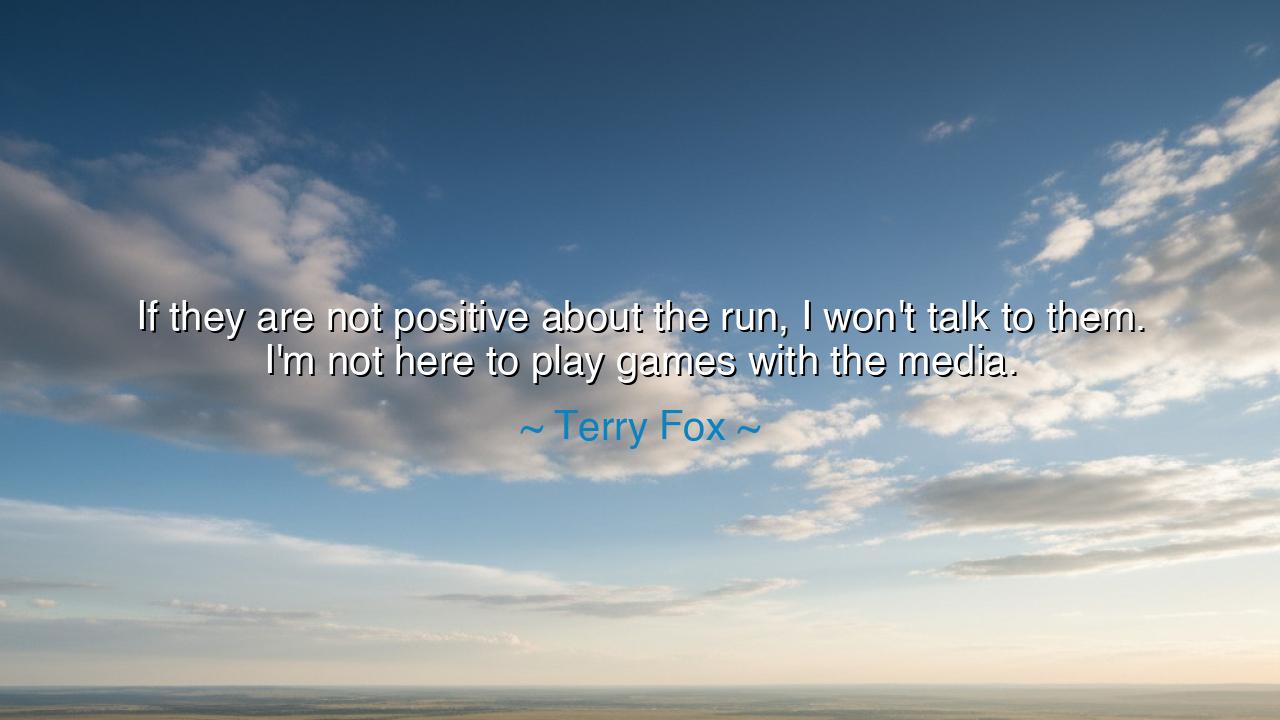
If they are not positive about the run, I won't talk to them.
If they are not positive about the run, I won't talk to them. I'm not here to play games with the media.






The words of Terry Fox—“If they are not positive about the run, I won't talk to them. I'm not here to play games with the media.”—carry the fire of a man whose mission was greater than his own comfort, reputation, or pride. They reveal a heart that refused to waste energy on cynicism or distraction, for his cause was too sacred to be diminished by triviality. His run was not for glory, nor for games, but for life itself—for hope, for healing, for the countless souls afflicted by cancer. In these words, we hear the voice of a warrior who knew his time was short, but whose resolve was infinite.
The ancients often spoke of the necessity of guarding the mind from corrupting influences. A soldier does not listen to the whispers of defeat when marching into battle; a prophet does not let the jeers of scoffers drown the truth of his message. So too did Terry Fox shield his spirit from the negativity of the world. He demanded that those who spoke of his Marathon of Hope speak with reverence, with positivity, and with understanding of its true purpose. Anything less, he rejected. For he knew that words shape perception, and perception shapes destiny.
History offers us parallels to this resolve. Consider the life of Florence Nightingale. When she sought to reform medicine in the 19th century, she faced criticism and mockery. Yet she refused to engage with those who trivialized her mission, focusing instead on the suffering soldiers who needed her light. Like Fox, she understood that to be distracted by derision was to betray the very people she served. Both stand as examples that true greatness requires not only courage in action, but clarity in focus—an unwavering refusal to waste energy on those who do not share the vision.
Fox’s rejection of “games with the media” is also a declaration of integrity. He understood that his mission could not be reduced to entertainment or sensationalism. It was not a spectacle for ratings, but a call to conscience for an entire nation. By demanding positivity in the coverage of his run, he was not asking for flattery but for truth: the truth that his sacrifice was not about himself, but about inspiring others to give, to hope, and to fight against a disease that claimed too many lives. His words reveal a spirit too noble to be compromised.
There is also in his stance a lesson in stewardship. Each of us has only so much strength, so much time, so much energy. To squander it on the doubters, the cynics, or the careless is to rob the mission of its power. Fox teaches us that to achieve greatness, we must guard our focus, surround ourselves with voices of support, and refuse to let negativity erode our resolve. His wisdom is not only for those who run across nations, but for all who run the quieter marathons of daily life.
The lesson for us is profound: know your mission, and protect it fiercely. When you are pursuing something noble, expect that some will misunderstand or belittle it. Do not surrender your time or spirit to them. Instead, give your energy to those who encourage, who build, who share in your vision. In this way, your mission will remain uncorrupted, your strength unbroken, and your purpose unshaken.
So, dear listener, let Terry Fox’s words echo within you. Whatever your journey, whatever your cause, remember: do not play games with those who cannot see its worth. Demand of yourself and of others the positivity that fuels hope. For as Fox showed us in his Marathon of Hope, when one walks—or runs—with unwavering focus and courage, the light of their mission burns so brightly that it inspires generations long after the runner himself has left the road.






VVippro
This statement sparks curiosity about the psychological approach behind it. Does limiting interaction to positivity actually increase effectiveness and morale, or might it create blind spots by ignoring criticism? I’m interested in how this tactic affects public opinion—does the media respond with respect or frustration? Additionally, it raises questions about discipline and leadership: how do strong personal boundaries contribute to achieving long-term goals without compromising engagement or public support?
NHNguyen Thi Ngoc Han
Reading this quote makes me reflect on the ethics of communication and intent. Is it fair to avoid engagement with those who are skeptical, or is this simply a way to safeguard mental energy and positivity? I also think about the larger message it sends: that one’s mission shouldn’t be derailed by doubt or cynicism. Could this philosophy be applied beyond media interactions, in personal and professional contexts, to preserve focus and integrity?
HYnguyen thi Hai yen
I’m struck by the determination and seriousness conveyed here. It makes me think about the role of media in shaping public perception. How do we balance staying true to a mission while still addressing potentially challenging or negative coverage? Does refusing to engage with negativity risk being perceived as evasive, or is it a powerful statement of focus and principles? This approach seems both protective and strategic, but I wonder how it works in practice.
TYpham thi yen
This quote makes me admire the focus and integrity of the speaker. It raises questions about how public figures manage interactions with the media. Is it more effective to engage only with positivity, or could avoiding critical questions limit public awareness and accountability? I also wonder how this approach impacts relationships with journalists—does it build mutual respect, or could it create tension? It seems like a deliberate choice to maintain purpose over publicity.